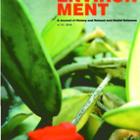Kathirithamby-Wells, Jeyamalar. “The Environmental Impacts of Japan’s Occupation of West Malaysia (1942-45) and its Socio-Economic Implications.” Global Environment 10 (2012): 92–115. Republished by the Environment & Society Portal, Multimedia Library. http://www.environmentandsociety.org/node/7579.
The Japanese occupation of Malaysia highlights the interrelation between war and the natural environment as forming an integral part of the national narrative and global environmentalism. By disrupting the economy and emasculating the forestry service, the Japanese military administration removed the restraints on forest invasion by the hungry and landless and simultaneously privileged Japanese cooperate business, which engaged in indiscriminate exploitation, ostensibly for the war effort. Despite the best efforts of the Japanese scientific wing, the breakdown of forest management wrought havoc on environment and health. Ironically, postwar restitution of forestry was based on two by-products of the war: the Malayan Uniform System of silviculture and new technologies of harvesting and transportation, which set independent Malaysia on the trajectory of unsustainable harvesting. But equally, the retreat to the forest of the hungry, the landless and the disaffected bred a new awareness of human interdependence, irrespective of ethnic differences, within a shared natural environment. The collective experience and memory contributed to the emergence of the nation’s first environmental advocates.
— Text from The White Horse Press website
All rights reserved. Made available on the Environment & Society Portal for nonprofit educational purposes only, courtesy of Jeyamalar Kathirithamby-Wells and XL edizioni.


